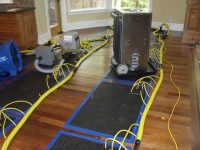How Winter Can Damage Your Home’s Foundation: Prevention Tips

Winter can be a difficult time for your home. One of the most common problems during this season is damage to your home’s foundation. If you are not careful, the cold weather can cause your foundation to crack or shift, leading to expensive foundation repairs down the road. In this blog post, we will discuss some prevention tips that will help keep your home’s foundation in good shape during winter!
Erosion: One of the main ways that winter can damage your home’s foundation is through erosion. When the ground freezes, it expands and contracts. This can cause the soil around your foundation to become loose and erode. If you have gutters, make sure they are clear of leaves and debris so that water can flow freely away from your home.
Water: Another way winter can damage your home’s foundation is through the water. Water seeping into cracks in your foundation can freeze and expand, causing the cracks to grow larger. Ice dams on your roof can also cause water to leak into your attic and down into your walls, leading to mold or rot. To prevent this, make sure you seal any cracks in your foundation and keep your gutters clean.
Temperature: The temperature changes during winter can also damage your home’s foundation. When the ground freezes and thaws, it can cause the soil to expand and contract. This can stress your foundation and cause it to crack or shift. To help prevent this, make sure you insulate your basement or crawlspace to keep the temperature consistent.
Cold Air and Drying Soil: The cold air and dry soil that come with winter can also damage your foundation. The cold air can cause the ground to freeze and heave, putting stress on your foundation and causing it to crack. The dry soil can cause the foundation to settle, leading to cracks. To help prevent this, make sure you keep your gutters clean and your basement or crawlspace well-insulated.
Freeze-Thaw Cycles: The freeze-thaw cycles that occur during winter can damage your home’s foundation. When the ground freezes and thaws, it can cause the soil to expand and contract. This can stress your foundation and cause it to crack or shift. To help prevent this, make sure you seal any cracks in your foundation and insulate your basement or crawlspace to keep the temperature consistent.
Melting Snow: Melting snow can also damage your home’s foundation. When the snow melts, it can seep into cracks in your foundation and freeze. This can cause the cracks to grow larger. To help prevent this, make sure you seal any cracks in your foundation and keep your gutters clean.
Ways to winter-proof your foundation:
If there are a few things you can do to winter-proof your foundation and prevent damage:
Check for frozen Pipes: Frozen pipes can burst and cause water damage. To prevent this, make sure you insulate your pipes and keep them from freezing.
Seal Cracks: Cracks in your foundation can let water seep in and freeze. This can cause the cracks to grow larger. To prevent this, make sure you seal any cracks in your foundation.
Keep Gutters Clean: Clogged gutters can cause water to back up and leak into your home. To prevent this, make sure you keep your gutters clean and free of leaves and debris.
Insulate Your Home: Insulating your home will help keep the temperature consistent inside, preventing the ground from freezing and thawing too much.
Consider getting a thermostat: A thermostat can help you keep the temperature in your home consistent, preventing the ground from freezing and thawing too much.
Pay proper attention to any warning signs: If you notice any cracks in your foundation or walls, leaking pipes, or wet spots on your ceiling, it’s essential to take action immediately. Here are a few warnings signs you should keep an eye out for:
-Cracks in your foundation or walls
-Leaking pipes
-Wet spots on your ceiling
If you notice any of these warning signs, it’s essential to take action right away to prevent further damage. You can repair small cracks with caulk or concrete sealant. For larger cracks, you may need to hire a professional. If you have leaking pipes, you should replace them as soon as possible. And if you have wet spots on your ceiling, you should check for leaks and repair them right away. You can prevent minor problems from aggravating by taking action early.
Winter weather can be tough on your home’s foundation. The freezing temperatures, melting snow, and freeze-thaw cycles can all cause damage. But there are a few things you can do to winter-proof your foundation and prevent damage. By taking some simple steps, you can help keep your foundation in good shape all winter long.







